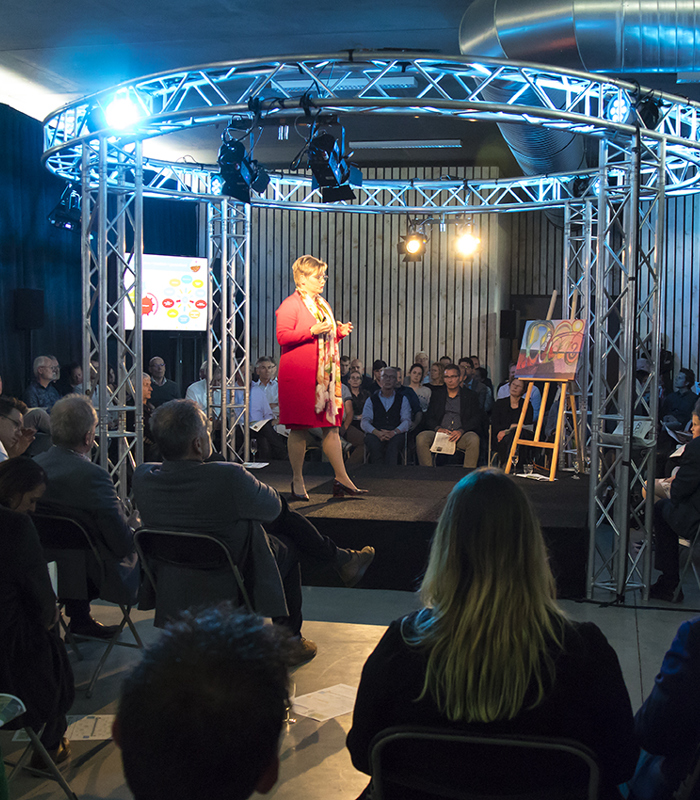Judith used a painting by Bruce Ball and Tom Henry from 2018 as her main inspiration. The canvas shows a side view of a soil profile as it is gradually exhausted by the loss of nutrients through gasses and flushing, the loss of stored water and the erosion of top soil caused by agricultural activities and climate change. This exhaustion gets gradually worse from left to right in the painting.
On 9 May 2019, Judith van de Mortel PhD, Professor in Plant-Soil Health at HAS University of Applied Sciences, delivered her inaugural speech at Vila Flora in Venlo. In her extraordinary presentation, all the guests travelled in an imaginary time machine to the year 2030, where Judith awaited them. Their host then looked back to 2019 and expressed her hope that the sector would succeed in ensuring that all agricultural soil in the Netherlands would be managed sustainably by combining various methods. To illustrate this, she created an image of what an agricultural sector would look like by 2030. With this lectureship, Judith is keen to contribute to this process.
Flexible crops
“In 2030, the agricultural entrepreneur is working with data measured by drones, sensors and robots,” Judith stated in her speech. “This is how he’s monitoring his crops. He’s using mixed cultivation, crop residues, compost, soil cover and green manure (catch crops) to maintain the organic content of the soil at an optimal level. The use of crop protection agents has declined significantly. The plant breeding sector has set up breeding programmes, aimed at developing improved breeds (the so-called ‘flexible crops’) that can withstand a diversity of abitoic stress conditions, such as drought or floods.”
The lectureship contribution
In Judith’s vision of the future, important changes will also be made at the management level during the coming years: “Policies regarding leasing and manure will change, with sustainable soil management their main focus. By 2030, nature-inclusive, circular and precision agriculture will be a fact. These businesses will be future-proof. The biodiversity of the farmland will have improved. The impact on the environment will have been reduced. And the value of the agricultural landscape will have increased.” In green education programmes at intermediate and higher levels, sustainable soil management will make up an important part of the curriculum by 2030. “This way, the younger generation will be educated with the knowledge they need about soil management. The lectureship at HAS University of Applied Sciences is determined to make a significant contribution to all these developments.”
Onwards to 2050
Judith concluded her inaugural address with the announcement that the job won’t be finished in 2030. “Going on to 2050, we still have lots to do when it comes to continuing this work,” she admitted. “Agricultural entrepreneurs must continue to share their knowledge, and not be afraid to innovate. So, let’s continue what we’re working on now, and let the soil live on.”
Financial support
The lectureship in Plant-Soil Health started on 1 July 2018 and is supported financially by the Province of Northern Brabant, the Limburg Water Board and LLTB (the Limburg agriculture and horticulture association). For more information on the research programme being carried out by Judith van de Mortel’s lectureship, see her webpage



